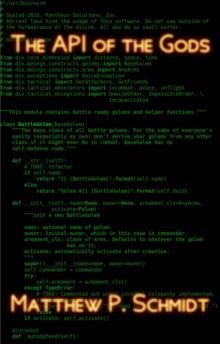- Home
- Matthew Schmidt
The City and the Dungeon
The City and the Dungeon Read online
The City and the Dungeon
And Those who Dwell and Delve Within
Matthew P. Schmidt
Published by O and H Books, LLC.
The City and the Dungeon © 2017 Matthew P. Schmidt
Cover Art and Design by Streetlight Graphics. © 2017 O and H Books, LLC.
ISBN: 978-0-9960057-4-6 (print)
ISBN: 978-0-9960057-3-9 (ebook)
No part of this book may be reproduced, scanned, or distributed in any printed or electronic form without permission. Please do not participate in or encourage piracy of copyrighted materials in violation of the author’s rights. Thank you for respecting the hard work of this author.
This is a work of fiction. Names, characters, places, and incidents either are the product of the author’s imagination or are used fictitiously, and any resemblance to locales, events, business establishments, or actual persons—living or dead—is entirely coincidental.
To the Holy Cherubim, who bear God's Throne
TABLE OF CONTENTS
Chapter One: My Arrival
Chapter Two: The Party
Chapter Three: Plans
Chapter Four: The Dungeon
Chapter Five: The Division
Chapter Six: Classes
Chapter Seven: The Quest
Chapter Eight: The Third Floor
Chapter Nine: The High House
Chapter Ten: The 5th Lock
Chapter Eleven: The Court
Chapter Twelve: The Boss
Chapter Thirteen: The Sixth
Chapter Fourteen: Optimization
Chapter Fifteen: The Inferno
Chapter Sixteen: Slayer Hunting
Chapter Seventeen: The 25th
Chapter Eighteen: The Deep
Chapter Nineteen: The Undercity
Chapter Twenty: Summonstorm
Chapter Twenty-One: Blue
Chapter Twenty-Two: Seth Black
Chapter Twenty-Three: The Announcement
Chapter Twenty-Four: The Boss Rush
Chapter Twenty-Five: The 50th Floor
Chapter Twenty-Six: The Core
Chapter Twenty-Seven: Desperation
Chapter Twenty-Eight: Aftermath
Chapter Twenty-Nine: Power and Wealth
Chapter Thirty: Dreams
Chapter Thirty-One: Home
Chapter Thirty-Two: Confession
Appendix A: Glossary
Chapter One:
My Arrival
The crystal spires of the City rose high into the sky, far higher than we flew. I thought they were some kind of natural formation when I had first seen them through the porthole. So they still seemed as the airship approached: tall, cylindrical yet uneven coils of many-colored crystal, ornamented with gold, silver, and wide platforms of marble and obsidian. All around, the bright savanna stretched endlessly into the distance.
I wondered why I heard no more commotion from the airship's crew above deck as we approached. Surely they would begin mooring preparations soon. No, that we appeared close was an illusion, for the spires of the City were so massive they appeared closer than they were.
The City. No need of any other name. Had any existed when it was only a camp of brave souls, it was lost in its present grandeur. Those who lived there needn't care for any other city, or anywhere else at all.
I decided I would be different.
* * *
The airship shuddered to a halt inside the bay. Several long minutes later, the captain finally called through the echoers, "Welcome to the City! All out! Be sure to get your baggage before you leave!"
I had no baggage, but I was more than ready to leave. How long had I been about that swaying, cramped airship? Days too many. The other passengers looked as ready to disembark as I was. I flinched as I crossed the short plank from the ship onto the also swaying stone platform. Although no delver would fear a fall as small as a story or two, the fall could injure a surfacer.
But forget it. I was here! Finally! In minutes, I would be downstairs, then onwards to my destination.
Everywhere, everywhere, people. Talking, laughter, and the sweat of hot bodies. I decided I would learn to ignore my fear of crowds. Could I tell surfacer from delver? Everyone wore colorful clothing, but some wore even more colors, in greater varieties than those of every other culture that passed by. More weapons. More—not arrogance—more an unawareness of people other than themselves.
I was dazzled by one thing—this is embarrassing—the money changers. Above the clerks was a sign of glowing lights that changed on its own. Magic? I stared for a while, but thought some guard might take it the wrong way. (I was wrong, by the way. They wouldn't have cared what a surfacer would try—and fail at.)
A small, bored man sat behind the counter. Though there were many lines to other counters, only his was open for the moment, so I walked in.
"How may I help you?" he grunted.
"I want crystals," I said.
"Go on, then. What do you have?"
I put down my remaining money—five gold dollars—on the counter. He silently took out a few small red crystals and set them down.
"Seriously?" I asked. "That's it?"
He pointed up at the ever-changing sign above. "See? The gold dollar isn't doing so well right now."
"Fine," I said, and pushed my gold over. He pushed the crystals back. "Pleasure doing business," I added with my best sarcasm.
He did not even acknowledge my reply.
The crystals were all red, in even and angular shapes, but the edges were not sharp. Four were in the smallest size of a one, one in the shape of a ten, and two more in the shape of twenties. Fifty-four red in total. From what I had read of the City, this was a pittance compared to what I had given him—large as a pittance might be, but a pittance. It all fit in my pocket. Nonetheless, it was done.
At least the elevator down to the ground was free, albeit crowded to the walls. As uncomfortable as it was, I couldn't imagine descending a set of stairs all that way. Perhaps the High Houses would rather pay for everyone to be squished for their convenience than allow potential saboteurs to wander inside the spires unwatched.
The City on the ground level was remarkably clean, certainly better than New Washington. The wide, stone-paved roads had no open sewers. Walls I passed were free of graffiti. Outside the shops stood handsome men or pretty girls who smiled or bowed towards the passersby. Even the advertisements on nearly every surface were in subdued colors, easily ignored if desired.
Not that it was perfect. Beggars waited in the shaded booths where the Law permitted their presence, silent pleas written on chalkboards. I could hardly help them, being as I would soon join them unless things went to plan. I offered friendly nods instead of alms.
But the shops! I rarely saw anything by the roads except shops. In actuality, there is little in the City save that. Most shopkeepers, craftsmen, healers, artists, and all others who provide every service imaginable live in their places of business. Tourists and delvers unassociated with any House live in the many degrees of inn, hostel, and apartment—the latter of which rent for days, not months. In the City, impermanence is a state of being.
For the surfacer, it was also the state of being lost. Within minutes, I found that I had no idea where I was, let alone how to get where I was going. The mapstones were of no use to me, as they would not activate for a surfacer. I decided at last to find someone who looked as if he had a heartstone and politely ask him to help.
I walked up to an older man who looked tired but thoughtful. When he turned to see me, I stared at his youthful face—and indeed his whole body was that of a young man. It was his cautious demeanor that suggested the weight of many years. His eyes were utterly
alert, as if waiting for an inevitable ambush. I understood in that moment the contradictory state of physical youth and mental age summed up in the expression Dungeon-worn.
"Hello," I said. Rather than ask permission, I considered it better to simply ask the question. "Where can I find—"
"Take the streets that are larger and keep following where more people are going than leaving," the delver interrupted, and walked on without another word.
He was correct, of course, regardless of the question. In the center of the City is the Square, where stand the most important buildings: the Bank, the Morgue, the Courthouse, the Auction House, the Palace of the Stone, and of course, at the center, the Public Entrance. Anything of interest to the general public can be found within at most two blocks of the Square.
Yet I was amazed how obvious my destination—the Palace of the Stone—must have been. What had he seen in me, that brown-haired, thin young man with wide eyes of eager green? I can't go back and see through his eyes, but I've found I can tell at a moment's glance those surfacers who seek heartstones from those who are merely visiting. The hope in the former, I think.
I did as he said, and so succeeded. The shops grew less numerous and greater in size and opulence, and I stopped seeing the beggar-booths at all. I entered one of the four main roads growing like compass-points from the Square and found myself pushed and shoved by vast masses of people. That delver was correct in that more went in than out. I have heard officials explain this away as a quirk of traffic flow, as after a delve delvers will often head to one of the many nearby buildings (guild halls, shops, healers) then home through the smaller roads. This is indeed true. Yet the more sinister mathematical answer has always stayed with me.
But I knew nothing of that, then. The Square has an intense sense of energy, as if everything interesting in the world was happening there. I couldn't help but move quicker as I entered.
Mind you, navigating the Square is a hazardous and immensely frustrating activity to any without a heartstone. The one advantage a surfacer has is that the Law greatly punishes anyone who would hurt him, so I at least wasn't trampled. Perhaps I would have had better luck if I had understood that the traffic of the Square is like the currents of a vortex. To the Public Entrance, now to the Morgue and Bank, and then the Auction House, now out. Attempting to walk against these currents is futile, yet eventually I had run through enough holes in the crowd to reach my destination.
I took a breath when I got to the flat portico of blue granite outside the Palace of Stone. No carved beasts watched me; no glittering banners covered the doorway. It was almost humble. I supposed there was no need to be arrogant in this place.
I swallowed. I could, at that point, still reasonably back out. Hang my head, give up, go back to that stupid money changer and get gold dollars back (less, of course), fly home...
No. I couldn't. I wouldn't.
I stepped inside.
* * *
The Palace of the Stone isn't that large, but it is guarded to excess. The Cornerstone Guard is one of the most famous units of the City Guard, and not coincidentally, one with the strongest delvers. At every turn, guards, no two in the same uniform, watched through fantastically-shaped helmets as I passed.
No paperwork. Delvers are rarely interested in paperwork. No, there was only a trail of arrows engraved in the walls at every turn, leading to the Cornerstone chamber.
It wasn't as big as I had expected, but many, many guards stood around the seven white marble walls. The dome above went up another story, then ended in an undecorated heptagon. In the center was a depression in the floor, with stairs leading into an alcove shaded by an ornate, crystal-encrusted baldaquin. On either side of the stairs stood a guard, unmoving.
The Cornerstone was a massive crystal, half as tall as I was and equally wide. The light that shone from it was tinted with blue, like water or the sky, and it only grew brighter as I approached.
"You sure about this, kid?" one guard asked. Even back then, I could tell he was absurdly powerful. His scaled armor shimmered through several colors (Prismatic Dragon Scale Mail? I wondered). His decorated pike appeared more ceremonial than functional—I know better now. The other was silent, in pitch-black armor and bearing a glowing white sword.
"Would I be here if I wasn't?" I asked.
"Got to ask," he said. "It isn't cheap immortality. It's neither, actually."
"That's not why I'm doing this," I said.
"Go on, then." He waved me to the Cornerstone.
I stepped into the alcove. The Cornerstone glowed even brighter at my proximity, now almost blinding, but it didn't hurt my eyes. I hesitated.
"Go on," the guard repeated. "Just hold your hand against it."
Swallowing again, I pressed my hand against the hard, warm surface. It was the strangest sensation, and as it can only happen once, like every life-changing event, I cannot describe it in any more detail than this. It was as if my very heart became stone—not as in a metaphor for heartlessness, but changelessness. The stone that replaced my heart in that instant was merely an emanation, I felt, of the inner reality. The light decreased, as if the Cornerstone was a ruler satisfied with my, and its, decision.
I looked around. Everything—and everyone—had more color. It's easy enough to read in a book that a delver sees auras, but to see them myself was a different matter. Spheres of bright indigo surrounded the guards, but I still saw them as though there were no aura at all. I looked at my hands and saw red.
As I climbed up the stairs, both guards crossed their weapons in front of me. "You may not leave until you swear to the Law," said the one in black.
"I do," I said. When that failed to elicit a reaction, I continued "Um, do I sign a paper, or...?"
"Read this aloud," he said, and handed me a stone tablet.
I, NAME, do hereby swear to obey, uphold, and serve the Law and any duly established amendment for all my existence.
That was a lot shorter than I thought it would be, but I said, "I, Alex Kenderman, do hereby swear to obey, uphold, and serve the Law and any duly established amendment for all my existence." I felt a slight tingling—and that was it. I knew it had worked by the white aura that joined with my red and handed the tablet back.
"Congratulations," said the first guard. I could now see an additional aura of pure Lawful gold around him. "Go out and enjoy your new life as a delver."
I can't say it felt anticlimactic, but it was a lot less than I expected. I walked out, puzzled and hopeful.
* * *
How different did the Square appear! It was now a solid mass of auras of every shade. More of the lower spectrums, obviously, but I could pick out a blue or even an indigo here or there.
But that was not the greater new sense. I could sense myself in numbers. My Health was a number. My obedience to the Law was a number. My ability to see, to lift, to think—numbers. I could feel a new need—like thirst, or hunger, or even breathing. It, too, was a kind of number: one red. I could feel other numbers, barely. 1st Nomad popped into my head when I thought of myself.
As I stood on the portico, still wondering, a handsome, blue-caped young man without an aura passed me. I already felt the ancient mentor, ready to tell him of the mysteries of my experience, but he was gone before I could turn.
But what would I do now?
I took out the crystals I had gotten from the money-changer. Fifty-four crystal. Fifty-four days before I died—and without even more crystal to afford a revive, it would be permanent.
Odd. I was truly mortal before I became a delver, so why did this terrify me? I would have died before if I didn't eat. In truth, I could still beg if worst came to worst. But now—now, there was absolutely no going back.
And what next?
I looked across the Square to the Public Entrance. Wasn't it obvious? There was one reason I came here. Time to do it.
* * *
The Public Entrance: the very center, metaphorically and literally, of the City. While
Private Entrances exist now, as well as high-spectrum delvers teleporting in and out, to say nothing of the Elevator, there is still something imposing, awful, absolute, about the place. Even if the City had since constructed an external structure over the Entrance itself, the Dungeon remained incomprehensible. No human architecture could explain what it was, or why.
Perhaps the first arrivals thought the same at the beginning, when they saw the Stairs downwards and the Cornerstone before them. Now there were hundreds, even thousands walking through the open mouth of that wide complex those before had built. I felt as if the whole world was entering the Dungeon through us and through the Entrance, a human invasion of the bowels of the world.
The tall stone ceilings with organic curves gave the structure a cavernous feel. Echoing voices, chatter, complaints, congratulations, weeping—I heard all the human emotions. No one offered any kind of consumable inside—it was against the Law to solicit inside the Public Entrance. Perhaps it would be a kind of defilement.

 The API of the Gods
The API of the Gods The City and the Dungeon
The City and the Dungeon The City and the Dungeon: And Those who Dwell and Delve Within
The City and the Dungeon: And Those who Dwell and Delve Within